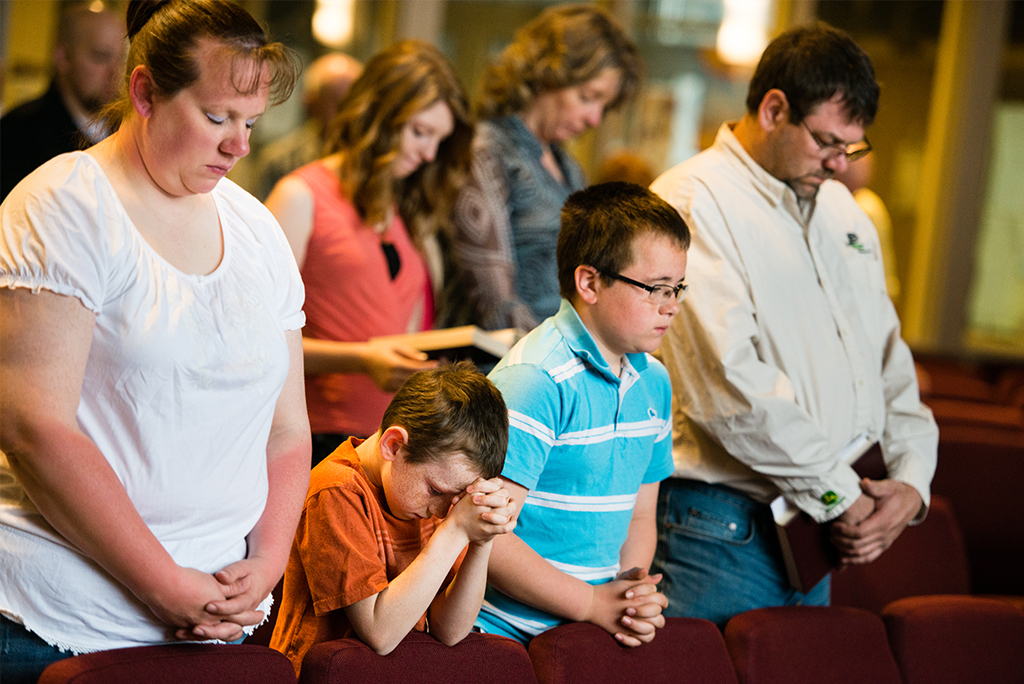
By Joe Isenhower Jr. (joe.isenhower@lcms.org)
ST. LOUIS — A clear message emerged from the Feb. 12-13 meeting of the LCMS Board for National Mission (BNM) here — the need to strengthen Lutheran families.
That especially became obvious in a report on the findings of recent demographic studies that looked into steady membership declines in the LCMS over the past 40 years.
The Rev. Heath Curtis, coordinator for Stewardship Ministry with the LCMS Office of National Mission (ONM), titled his presentation to the board “Generational generosity: The demographic challenge facing the Missouri Synod and our response.”
He noted that the Synod “has shrunk in overall membership by more than one-fifth since the 1970s, with half of that loss occurring just since the year 2000,” and largely attributed those declines to “a birthrate among our members that is only one-fourth of what it was in 1956.”
Curtis included information from two recent research reports commissioned by the Synod — “Generational Generosity, a report to the LCMS” by Dr. Ryan MacPherson and “The LCMS in the face of demographic and social change” by Dr. George Hawley. He noted that both researchers are practicing Christians.
In his written report, Curtis quoted from Hawley’s document, as follows: “There are many explanations for the decline of various Protestant denominations —growing secularism in society, a failure among churches to remain relevant in the modern world, and an inability to connect with certain demographic groups. While these factors may play a role in declining church membership and attendance, this paper examines one of the most important causes of [the] LCMS’ decline: low fertility among its adherents.”
Curtis asked how the BNM — in developing policy to support the work of the ONM — might “lift up the strength of the Lutheran family.”
“We need to think about being the entity in the Synod that lifts up the Lutheran family and its health and wellness as a goal for the other institutions in the Synod,” he said.
ONM Executive Director Rev. Bart Day added at the end of Curtis’ presentation that he agrees with him about the need for a “collective, concerted effort throughout the Synod to strengthen the Lutheran family.”
Report on Millennials
The Rev. A.J. Espinosa — assistant pastor of Messiah Lutheran Church in St. Louis and a graduate student at Concordia Seminary, St. Louis, addressed the board concerning the Millennial generation, made up of those born between the early 1980 and early 2000s.
Espinosa said that many Millennials “don’t think they need religion, reject many of its tenets and have found other routes to fulfillment,” including “fulfillment in alternative forms of community.” He said that tends to “isolate them demographically and/or involve them in addictive behaviors.”
Espinosa pointed out that Millennials typically reject creationism and “discredit the Bible as the authority on marriage and sexuality.”
“However, Millennials do want to learn,” he added, recommending that pastors prepare and deliver their sermons to contain “engaging information.”
Espinosa cited a finding of a Barna survey that young adults in churches are two times as likely to remain in the Church if they have a connection with someone outside their age bracket. So, he also encouraged congregations to offer intergenerational opportunities, rather than segregating age groups.
He also urged congregations to “offer more support for people trapped in addictive behaviors.”
BNM member Rev. Dr. Alfonso O. Espinosa — who is the Rev. A. J. Espinosa’s father — told Curtis, “What you said is spiritually convicting. And we just heard a presentation on Millennialism that demonstrates the false gods of our culture. We must emphasize what God has already given to this confession with the theology of the cross.”
Recognized Service Organizations
Deaconess Dorothy Krans, the ONM’s director of Recognized Service Organizations (RSOs), provided the board an overview and update from her office.
Currently some 181 organizations and 152 schools hold LCMS RSO status.
“RSOs provide resources and services for congregations to use,” Krans said.
Also on the agenda
In addition to hearing reports from Synod President Rev. Dr. Matthew C. Harrison, LCMS Chief Mission Officer Rev. Kevin Robson and Day, the BNM continued its primary work of fine-tuning policy to undergird the work of the ONM, worked through a process for monitoring how the ONM is implementing BNM policies and adopted several resolutions for consideration by the 2016 LCMS convention.
Reflecting its family concerns and priorities, one of the BNM’s overtures to the convention is “to make strengthening Lutheran families a mission priority for The Lutheran Church—Missouri Synod.”
The next meeting of the Synod’s Board for National Mission is scheduled for June 3-4 in St. Louis.
Posted Feb. 23, 2016




Excellent article. I would like to learn more about how we can specifically minister to this age group.